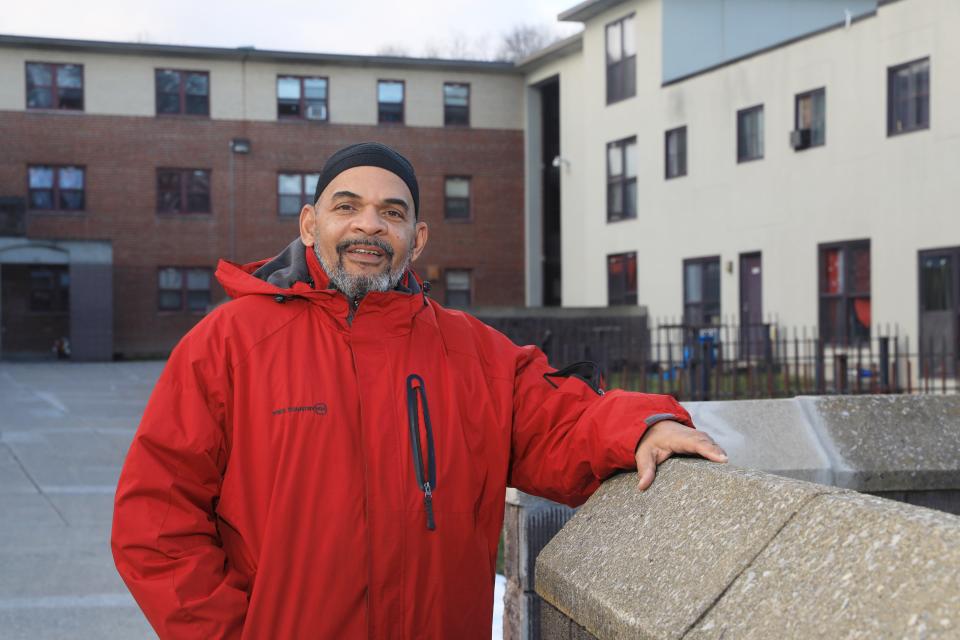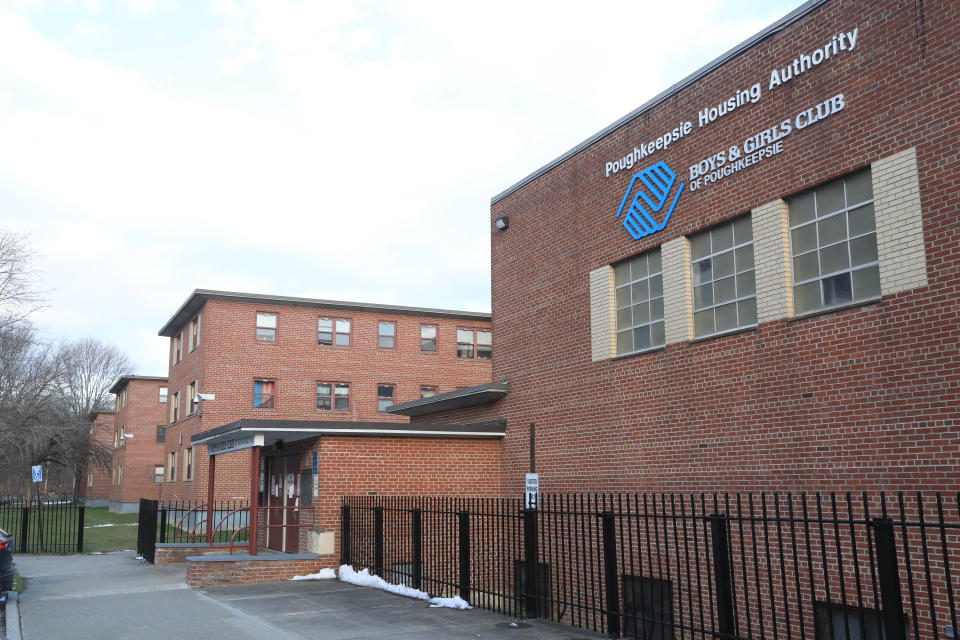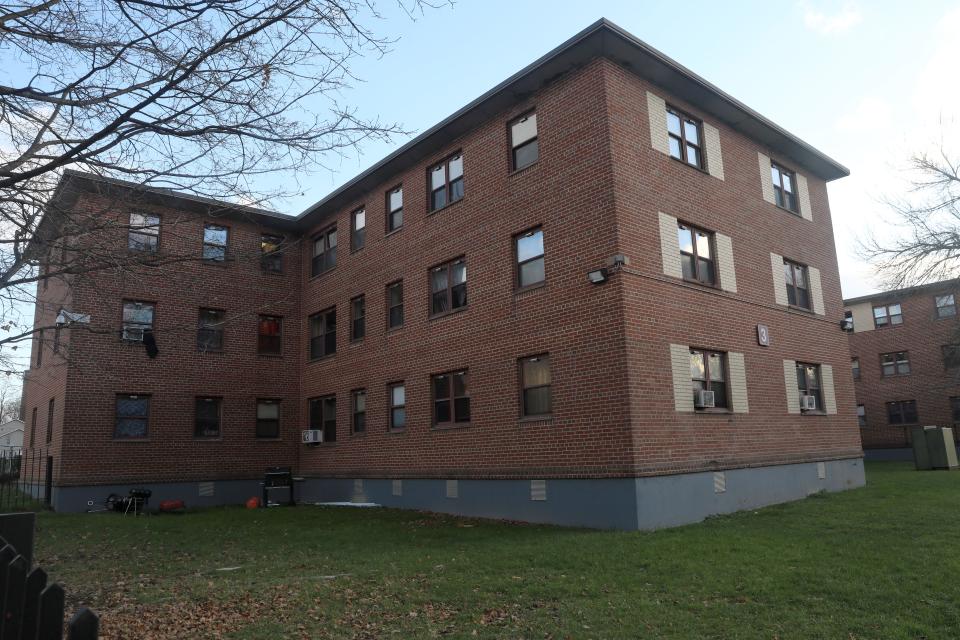Poughkeepsie Housing Authority to negotiate with redeveloper for Hudson Gardens Apartments
Scott L. Johnson sits by himself during the Poughkeepsie Housing Authority board meetings.
He's the only tenant who has attended the last few meetings who isn't a board member. The housing authority is deciding next steps in the process that could lead to rebuilding the Hudson Gardens Apartments on Smith Street, otherwise known as the "Bricks."
Johnson attends because he believes tenants were excluded from discussion that will directly impact their lives. Redevelopment could lead to relocating tenants and possible inclusion of market rate units could bring about its own ramifications. In October, the board chairperson announced a last-minute decision that prevented residents and even some board members from attending a meeting where developers presented their ideas for review.
"If you don't have any input from residents, how can you honestly say they were a part of it?" said Johnson, who has been living at the Smith Street apartments with his family for about two decades. He noted that the U.S. Department of Housing and Urban Development, which oversees the Rental Assistance Demonstration, or RAD, program, encourages tenant participation and feedback and had been trying to organize tenants to help keep them informed and engaged.

The housing authority sent out a request for qualifications earlier in the year seeking developers to partner with the housing authority through the RAD. The program could lead to the privatization of the public housing by turning it into a project-based Section 8, opening the door for private investment.
The PHA appointed an evaluation committee which reviewed and ranked six submitted proposals. The board plans to start negotiations with the highest ranked firm early next year. The three firms that were selected to present in October in order of highest ranked were Beacon Communities along with Kearney Group, JHM Group and MDG, though the names were not make public until last week.
Beacon Communities, based in Boston, was ranked highest due to its "realistic and detailed methodology," the firm's prior experience with "comparable projects" and "local experience," according to a report by Joanna Longcore, assistant corporation counsel for the city of Poughkeepsie and the chairperson for the evaluation committee. She did not include any details about what the agency had proposed.
The real estate agency has offices in Boston, Albany and Pittsburgh. Its portfolio contains market, affordable and senior housing in 11 states and the District of Columbia. The agency works with acquisition, development and property management, and has experience working with the RAD program.
Beacon Communities and Ken Kearney, who is one of the main developers of affordable housing in Dutchess County, denied the Journal's request for an interview.
Premium:Public housing in Poughkeepsie may be changing. Here's how.
Premium:A broken ladder: Why fixing housing affordability in Dutchess is more than a city problem
Hudson Gardens, which has 184 units, has been in need of redevelopment given the deterioration of the buildings and security problems. Whether the buildings will be partially or wholly demolished and rebuilt, or just renovated, will be decided by the public-private partnership created through the RAD process. The housing authority is leaning toward new construction on both the Hudson Gardens and Martin Luther King Gardens properties.
The partnership could change who manages the building. Once the conversion is completed, tenants would need to sign new leases. Those familiar with the RAD process say the program is successful when residents are kept informed throughout the process, and housing advocates are involved who understand the ramifications. Tenant vigilance and housing advocates will help protect housing costs from increasing and mitigate relocation issues.
Johnson, who is part of the eight-member resident advisory board, said it's been challenging to get residents involved and that it will be difficult to gain back the trust of the residents who showed up for the presentation meeting. They were told the RFQ didn't include any provisions that opened the review process to tenants.
"Unfortunately, we didn't see around curves and bends and at this point in time, with the (RFQ), it didn't lend itself to public participation," said PHA Chairwoman Shirley Adams.

What to watch for in contract negotiations
Lauren Song, a senior attorney with the National Housing Law Project who focuses on federally assisted housing preservation, stated that while the level of information provided to tenants and their participation wasn't "ideal" it still met the minimal requirements of HUD's RAD process.
Even though HUD emphasizes public participation in the process, a spokesperson stated that "during the procurement process and in the selection of a RAD developer, bidder information is considered private and confidential."
As negotiations start, along with the discussions regarding the actual design of what's built, tenants should be watchful of how the relocation is structured and who ends up managing the property.
Tenants may need to relocate for multiple years depending on how long construction takes to complete. If this is the case, the developer could be asked to rebuild first before demolition is scheduled. A shortage of housing that is affordable under Section 8, may make finding housing to relocate tenants challenging.
"That means there should be a financial closing for the new construction before any demolition and displacement of tenants," Song stated, emphasizing this was very important to avoid the permanent displacement of tenants.
The public-private partnership may also reduce the number of parking spaces for existing tenants if market units are added and require tenants, who are already cost-burdened, to pay for their own utilities. Private management agencies may also enforce their own lease terms or "house rules."
The PHA also noted in one of its RFQ documents that "income-mixing" means at least 75% of the units will be subsidized, and the rest would be higher income levels which may include market rate units. If the developer decides to include market rate units, it would need to seek a zoning variance to increase the number of units.
Subsidized units would be for those making 30% to 120% of the area median income. The inclusion of market rate units may complicate how the PHA will continue to manage the site. Ownership and management of the property would need to be negotiated, though the RFQ states the developer will select and oversee a management firm.
"We want the PHA to continue its ownership of the public housing land and ideally, also the buildings as well as have full control of the management in compliance with all HUD and other subsidy rules and tenant rights and protections," Song said. "But it is challenging for a public housing authority to own and manage the market units without creating a separate legal entity.

Seeking a voice as the process moves ahead
In September, the board invited residents to share their input on plans to redevelop the Hudson Gardens Apartments. At that meeting, residents spoke about what they would like improved about the living conditions at the apartment such as security issues, heating problems and maintenance. The discussion also included concerns over rent increases, relocation and why residents were notified of the meeting hours before the start time.
During the meeting PHA Chairperson Shirley Adams suggested an October date for the developers to make their presentations. She said that while board members could attend, the PHA needed to make sure the meeting could be opened to tenants. Adams assured the room she wanted "residents to be partners and to participate" in the process.
However, when board members and tenants arrived for the presentation, they were told the meeting was limited to the evaluation committee. The committee included the committee chairperson, PHA board chairperson, the board tenant representative, PHA executive director, accountant and PHA's outside consultant for the redevelopment project.
Adams said this was because the RFQ lacked language that allowed for a public meeting. The RFQ used by the board was "straight out of the HUD playbook." She said that one possibility would have been to ask the developers to sign a waiver allowing for a public meeting, but they did not have enough time to do that.
Longcore, the evaluation committee chairperson, explained that her concern with allowing residents to participate in that meeting was because of the RFQ and that residents involvement may have been seen as influencing the decision making process.
Tenant participation in the RAD program differs between housing agencies. However, HUD requires housing authorities to hold two meetings with residents prior to submitting a RAD application.
The Municipal Housing Authority for the City of Yonkers took a different approach. Tenants at affected sites were given "detailed" information that included the RAD process, potential and and selected developer information, according MHACY. Residents participated in presentations from potential developers. The review committee was then given resident feedback before the final selection.
While some PHA board commissioners were comfortable with moving towards the negotiation phase, others aired their concerns about being kept out of the presentation meeting, for not having a clearly outlined process and being asked to negotiate with a developer without being informed about what the other proposals contained.
The board had previously spoken about put together a report detailing the proposals. Instead members were provided with a report that included the names of the firms along with their ranking, without any information about the proposals.
The tenant representative, Jacquetta Brown, who was on the evaluation committee stated during a meeting she was not "comfortable" and asked if the RFQ process could be redone to include more participation.
"We've agreed that the process was raggedy and could have been done better, but in the situation that we were in, it was what we could do," Adams said, adding that the board knew of the review process beforehand, and had access to the RFQ.
Saba Ali: Sali1@poughkeepsiejournal.com: 845-451-4518: @MsSabaAli
This article originally appeared on Poughkeepsie Journal: Poughkeepsie Housing Authority deciding next steps for 'The Bricks'
